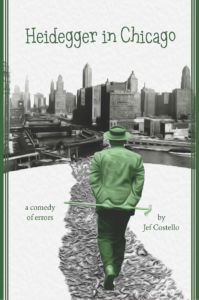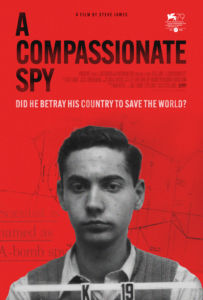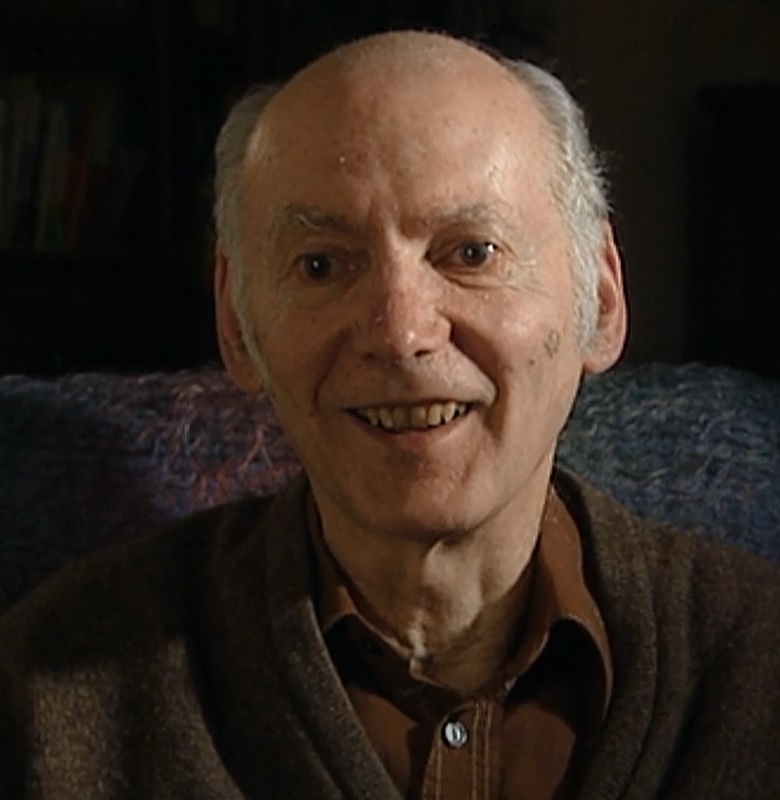A Compassionate Spy?
Posted By Beau Albrecht On In North American New Right | Comments DisabledThe recent film Oppenheimer [2] brought a renewed interest in the history of atomic espionage. The names certainly echo throughout history: Julius and Ethel Rosenberg, David Greenglass, Morton Sobell, William Perl, Harry Gold, and more. Then there are other notables, more obscure but whose activities were considerably more damaging than the above-named. One was known in the Venona decrypts — a batch of intercepted Soviet cable traffic in the 1940s — by the codenames FOGEL and PERS. It still remains a mystery who “Perseus” really was, but this might have been Oppie himself, among other possibilities.
Another big banana was an obscure physicist fresh out of college, Ted Hall (formerly Theodore Holtzberg). A biographical film in 2022 described his espionage activities, which some have recommended as supplementary material for Oppenheimer. Ted the Red’s bio is called A Compassionate Spy. Such a title melts my heart like the core of Chernobyl reactor 4.
For a brief historical background, during the War to Make the World Safe For Democracy, the United States was shipping our good Soviet buddies anything they wanted [3] through the Lend-Lease program. Frankin Roosevelt’s chum Harry “The Hop” Hopkins, a long-term couch-surfer at 1400 Pennsylvania Avenue, personally made sure they got it. If not for his diligent efforts, the Wehrmacht, the Luftwaffe, and the SS would’ve put an end to World Communism by 1943, if not sooner. (Oh, noes!) American generosity included free uranium ore, which our Russian pals daringly called “bomb powder.” All they needed was some assistance in putting it together.
That’s where fine fellows such as the Rosenbergs, “Perseus,” Ted Hall, and so forth kindly helped. It turns out that some of those “anti-fascist” refugee scientists were at least a bit pink around the edges. The home-grown pinkos certainly did their part as well. Their efforts were instrumental in making sure that our wonderful Marxist friends abroad got The Bomb, too. The final product was the biggest game-changer in warfare since the invention of gunpowder. Then we found ourselves in a decades-long nuclear standoff which could’ve burnt the world to a crisp. Oopsie!
Secrets unveiled at last
A Compassionate Spy opens with Ted Hall on June 3, 1998, by then quite elderly and in declining health, discussing his earlier days. Getting right down to business, when his wife Joan asks why he participated in espionage, he explains:
Well, like virtually all of the academic people, at least at Los Alamos, I was quite concerned with the question of what the world would be like when the Second World War was finished.
Does this mean nearly all were like-minded about that? Ouch!
Ted was a child prodigy from New York who graduated from Harvard at 18. During this time, his roommate was Saville “Savi” Sax. Despite the eminently WASPish name, he had the same background, as well as the same Communist sympathies which all too often were a package deal. After graduation, Ted the Red was recruited for an important and very secret program in the autumn of 1944. This, of course, was the Manhattan Project, which developed the atomic bomb. The film describes an interesting story that paved the way — in more ways than one — for his recruitment into the project. If Los Alamos hadn’t been so muddy at the time, history might’ve turned out much differently!
 [5]
[5]You can buy Beau Albrecht’s Space Vixen Trek here [6].
The movie states that Ted went directly to the Soviet embassy in New York. For those interested in a fuller version of these events, much further detail can be found in the book Spies: The Rise and Fall of the KGB in America. (Note that this is a friendly account; in the Introduction it states that its co-author, Alexander Vassiliev, was raised in the Soviet Union and still considers America’s atomic spies to be heroes. According to the book, they went to the Communist Party USA first. Sweet! Someone there knew some people, and got Ted lined up with a KGB spook. Surely it made a splash when a pimply kid walked in the door unannounced, volunteering secrets from the big science project in the desert.
It seems they didn’t know what to make of Ted at first. He did have some impressive radicalinski street cred for a teenager, but they still feared a setup. Ted gave them names of other scientists in the Manhattan Project as well as convincing technical documentation, demonstrating to Comrade Kurnakov that the kid was the real deal.
This adventure occurred in late October 1944, surely Ted’s first trip back home from the wilds of New Mexico with nary a decent delicatessen in sight. After this, Saville served as his go-between, delivering information to their Soviet buddies. They’d worked out a code system based on Walt Whitman’s Leaves of Grass. The movie doesn’t say so, but Lona Cohen — who seems sort of a radicalinski mama-bear type — took on this courier role beginning in August 1945, helping Ted smuggle the information out of the Manhattan Project.
According to the movie, Theodore’s contribution to the Soviet atomic bomb corroborated some of what they received from other sources — I would wager with greater detail than they had before. This convinced them that it was a workable project, and they committed considerable resources to duplicating the “Fat Man” implosion bomb design. By the film’s estimation, this hastened the USSR’s nuclear program by five years. Go, Ted, go!
Why did he do it?
Following the first atomic test, the film shows Ted the Red looking despondent while others celebrate jubilantly in the next room. The camera pans over to a petition dated July 17, 1945, which was signed by Leo Szilard and some lesser notables. Daniel Axelrod narrates the following:
A large group of physicists in the Manhattan Project wrote a letter to Truman, who was the President at that time, that they didn’t sign up for working on this to bomb Japan.
Although the letter has some arguable points, there’s something amiss. So they worked diligently to develop the atomic bomb, but when Germany surrendered and Japan became the country being targeted, suddenly they had a change of heart. What’s up with that one? The answer should be glaringly obvious. If you don’t get it, then it’s back to the junior varsity team for you.
The film documents images of devastation, with Japanese civilians badly burnt and scarred. Indeed, that much is quite ghastly. The soundtrack plays some jingoistic, bad-taste hit from the time about nuking Hiroshima and Nagasaki. Ted the Red explains:
I was afraid that a state with such a [nuclear] monopoly might spell . . . might trigger very catastrophic events. The main enemy was viewed to be Russia after the war was over.
Then he mentions there were case studies of how many nukes it would take to defeat the Soviet Union. Uh-oh! First-strike strategies were contemplated. Well, that was unexpected . . .
On the side of the United States, we’re looking at the nuclear war planners, being largely from Wall Street. A very large portion of them were Wall Street bankers and industrialists. They had a view that the bomb would be a monopoly and allow the US to easily take over the imperial role around the world. Bankers and industrialists want economic domination.
The film shows a montage of businessmen who rose to prominent roles in the government and the Council on Foreign Relations [7]. Although there’s something to this Leftist critique, he really didn’t have much to worry about regarding the Deep State swamp critters at the time. A gaggle of them were still playing footsie with their Soviet buddies and undermining America’s foreign policy until Senator Joseph McCarthy was assigned the thankless task of taking them out to the woodshed. Joan Hall fills us in further:
We actually joined the Communist Party because they seemed to be the most decisive opposition of the American Right and the Republicans and people who were against unions. And against strikes and against black people very often. I mean, this was Trumpian, basically.
Orange Man Bad! Again, they needn’t have worried so much. The US didn’t become a paleoconservative country with fashy tendencies in which a strong government puts the interests of real Americans in first place. Instead, we got a globalist dildocracy run by money-grubbing oligarchs at war with the founding population. Way better, right? Ah, progress!
Around this time, the film also shows some pop-culture literature describing the hideous brutality that would ensue if the US were to fall under Soviet occupation. The filmmakers meant this brief montage to look sensationalistic and jingoistic, but it was hardly different from what happened to other countries the USSR overran in 1944-45. Quite regrettably, current events show that Russian military culture still hasn’t discarded these loathsome traits.
Thus, The Compassionate Spy implies that all these factors inspired Ted the Red to begin his atomic espionage and break the American nuclear monopoly. Well, there’s a little problem with the timeline here. The first nuclear test was in July 1945, and the bombings of Hiroshima and Nagasaki occurred in August. Relations with the USSR didn’t start to sour until 1946, after which they reached nightmare level in 1947 and stayed that way until about 1989. However, it was October 1944, shortly after joining the Manhattan Project, that Ted the Red walked into the Soviet embassy to offer his services as a spy. In that case, he betrayed his country at the first possible opportunity. Explanations relating to things that happened after that obviously don’t wash. Maybe all that made him feel better about what he was doing when these things came to pass, but he went into it with other motives.
Life after Los Alamos
Following his departure from the Manhattan Project, Theodore went to the University of Chicago for a graduate program, and Saville went with him. They were even interested in the same bird. Seeing a picture of Joan sprawled out with the two of them on the campus lawn, I at first wondered if a Bloomsbury Group type of threesome might develop. But that’s not how it played out. The reverse Betty-and-Veronica dynamic ended up with Ted marrying her. Both were secular, so they probably jumped over a broom in front of a judge.
Before that, he discloses his prior espionage activities. Joan is fine with that, since she’s a True Believer, too. (Other than that, she does the interviewing and much of the narration during the film, and retained her ideology throughout.) Another documentary [8] discusses her thoughts on the matter:
NOVA: How did you feel about it?
Joan Hall: Well, I was surprised. But it didn’t seem like anything particularly bad to me because I still believed that the Soviet Union was good, even though the American propaganda machine had turned completely in the other direction. And I believed that socialism was good.
I was aware that this was something that was not exactly done. It was something extraordinary. I suppose I was aware that it was somewhat dangerous, but I didn’t realize how dangerous it was really. I wasn’t frightened. I certainly wasn’t turned against Ted. It made me feel more than ever that he was someone exceptional.
NOVA: What did he say he’d done?
Joan Hall: I can’t remember the exact words with which he described his action, I’m afraid. But they were certainly straightforward and very brief.
NOVA: Did he say why he had done it?
Joan Hall: Yes. He told me that he had done it because he was afraid the United States might become a very reactionary power after the war. Those were his words. And that this would give the Soviet Union a better chance of standing up to them — or that he hoped it would. That was the explanation that he gave.
He got into cancer research around this time, using his big noodle for something worthwhile at last. The film doesn’t describe this, but it was then that Ted lost his security clearance. That’s why he stopped spying and had to find something else to do. Part of this was because he’d subscribed to radicalinski literature while working at the Manhattan Project, and they didn’t cotton to pinko periodicals arriving in the mail. That certainly was a dumb rookie mistake. What was he thinking?
The heat is on
Acting on intelligence from the Venona decrypts, the FBI interviewed both Theodore and Saville. (These two were respectively codenamed MLAD and STAR, meaning “young” and “old,” though Savi was only about a year older. Whichever comrade was coming up with those pseudonyms was sometimes a bit of a wag.) Both of them play dumb. On the second day, Ted the Red said to the feds that he didn’t want to talk any further. After some sputtering, they let him go. Savi got wise, followed suit, and clammed up, too.
 [9]
[9]You can buy Francis Parker Yockey’s The Enemy of Europe here. [10]
Ted started to get cautious, gathering all his pinko literature at home and deep-sixing it in a river. Joan had to resign from her radicalinski activities. Even so, the investigation continued. The glowies bugged Ted’s phone, sending in a repairman on a bullshit pretext to tamper with it. (That was the closest I came to cracking up in the film.) They also began frequently tailing his car. Eventually the couple moved to Britain, where Ted was hired at Cambridge.
Julius and Ethel Rosenberg weren’t so lucky, and were prosecuted and sentenced to death. (The former’s Venona codenames were ANTENNA and LIBERAL, a rather unfortunate pseudonym for an atomic spy.) The pair have often been called small fry, which was literally true given their high-voltage demise.
What about the big fish? The film does describe our sensitive Theodore feeling bad on their behalf. He didn’t know the Rosenbergs; they had worked in a different department of the Manhattan Project. Even so, Ted the Red was tempted to confess at last and take the fall to spare their lives. On that fateful Juneteenth, as he and his wife drive past the Sing Sing penitentiary with mournful classical music plays on the radio, they feel a deep twinge of sorrow. It’s touching that he felt bad for a couple of comrades he never met who rode the lightning. Did his gigantic conscience feel much of a twinge about putting his fellow Americans under the threat of nuclear devastation?
Some historical context
I’ll add some details to give the Civics 101 take on all this. The authorities had had to release Theodore and Saville because they weren’t under arrest. Had they run their big yaps any further, it’s possible they might’ve talked themselves into a corner, giving probable cause to bust them. It would’ve been more prudent for them to refuse to talk from the beginning. (Had they been arrested, they should’ve demanded an attorney, invoked the Fifth Amendment, and clammed up immediately.) Of course, they were guilty as hell and the FBI knew it, but it was thought that decrypted documents alone wouldn’t have been strong enough to stick in court. The movie doesn’t discuss it, but there was reluctance to disclose the Venona papers’ existence. The FBI therefore needed corroborating evidence. A confession would’ve been perfect, or at least some incautious talk that would’ve tripped them up in a contradiction.
As for the Venona decrypts, their existence remained unknown to the public until the Cold War was almost over. Even then, it wasn’t until 1995 that the contents were made available. Ted Hall himself had only four years left, and because of his advanced age and the changing geopolitical situation, he escaped his past deeds without penalty. Thanks to the official secrecy about the Venona project being maintained far longer than necessary, as well as the mainstream media’s extended cover-up about the “Red Scare,” for generations the public was led to believe that Senator Joseph McCarthy was howling-at-the-moon crazy for alleging that there was a massive Soviet subversion campaign [11].
The final word
 [12]
[12]You can buy Jef Costello’s Heidegger in Chicago here [13]
There’s more details shown, but you can smurf a copy of the film and see for yourself. As a historical document, A Compassionate Spy certainly makes for an interesting account with a unique perspective. If you want to know why your parents and grandparents had to do “duck and cover [14]” drills under their desks, now you have a better idea of how the decades of nuclear terror called the Cold War got started. There were other spies involved as well, of course, but Ted the Red certainly did his part.
As a whitewashing job, though, the movie falls flat. To name just one problem, when Joan describes him as being scrupulously honest, it gets a bit surreal. For instance, “Ted was a person who did not lie.” Did that apply to his FBI interview, in which he pretended he didn’t know anything? Or how about when he signed off on the Manhattan Project’s non-disclosure agreements? Even Bill Clinton is capable of selective honesty!
If one searches for a heartfelt apology for all this, it’s not there. Our compassionate Theodore never says, “I was young and idealistic, and I recklessly made a terrible mistake which resulted in tremendous harm to my country’s national security and threatened world peace.” Nope, didn’t happen. Did he have any major qualms about his activities? We do have this much at least from Joan:
The fact is that he did say, in later years, that had he then known of all the horrors perpetrated by the Soviet government, he wouldn’t have had the stomach to pass information to them. That is very possibly true, but it’s also the case that if he hadn’t done it, it would have been a misfortune for the world.
That may be mighty thin gruel as far as penitence goes, but that’s all we’re getting. Nonetheless, in his own words, Ted the Red says the following right at the beginning of the film:
Joan: Did you have any sense that you were doing something that was disloyal or morally dubious?
Ted: In my mind, this was the question of protecting the Soviet people as well as all people from wanton attack. Preventing an overall holocaust, which would affect the entire world, really.
So there you have it. If a Leftist has a nice-sounding rationalization, even treason is okie dokie. This punk kid’s effrontery was phenomenal; taking it on himself to fiddle with the post-war balance of power. Worse, his actions greatly benefited the USSR, the most thuggish despotism in modern history, and were to the detriment of the US, his home and still a remarkably free country at the time. Given his Communist sympathies, it’s a fair bet that helping his Soviet buddies was at the top of his list of priorities. If the major concern was about the bad old USA having a nuclear monopoly, then he could’ve smuggled the atomic secrets to any other country — France, Australia, Switzerland, or even sunny El Salvador — but that’s not what he picked. That’s because he preferred the Soviet political system over that of the French, Australians, Swiss, or Salvadorans.
Historical interest notwithstanding, I don’t find the evasions in A Compassionate Spy to be so convincing. If that’s how Ted Hall felt, then he and the likes of him had no business working in the Manhattan Project. Instead of being a sneaky spy, he should’ve been an honest pinko, moved to his favorite country, and taken care that the door didn’t hit him in the ass on the way out.
* * *
Like all journals of dissident ideas, Counter-Currents depends on the support of readers like you. Help us compete with the censors of the Left and the violent accelerationists of the Right with a donation today. (The easiest way to help is with an e-check donation. All you need is your checkbook.)
For other ways to donate, click here [15].

